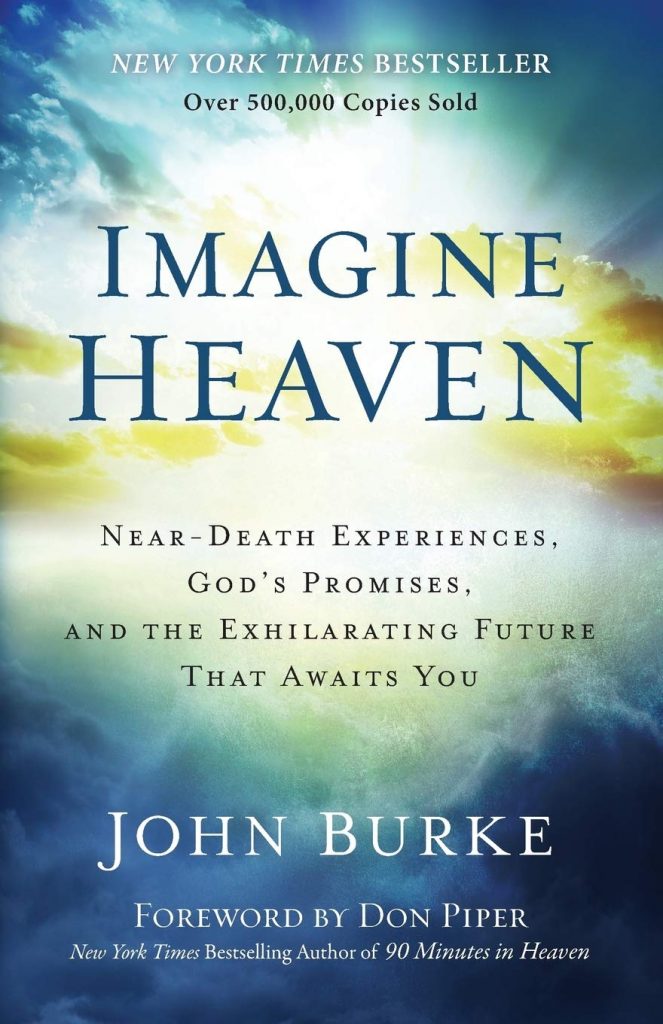I just finished reading “Imagine Heaven” by John Burke. While there were numerous Near-Death Experiences (NDEs) reported from clinical studies, the author does well at recounting some of them in explicit detail. The unique stories of individuals who passed away came from a variety of causes, as recorded from testimony accounts. Each of which pertains to what happened immediately after the death of individuals as collected and interpreted by Burke coming from his research across various studies.
Book Review
The book is structured in a way to give a reader a sense of tangibility about heaven; the spiritual domain of God in terms of encounters, place, beauty, occupants, and well-being. It is acknowledged and reviewed by reputable philosophy and theology authors (and professors) Moreland, Strobel, and Habermas. While the book is stimulating, it often references scripture concerning the necessity of Jesus Christ for eternal salvation.
While there is sufficient reason to dismiss some experiences as having no evidentiary value, a reader is further served by looking at what the subconscious mind is and does as a point of reference and comparison. The book doesn’t cover enough of that to separate dream-state conditions, from actual out-of-body experiences that occurred. More attention could have been placed upon valid skepticisms touched on in the book.
Two qualified and quantified considerations are presented within the book to capture a reader’s attention. The relevance of these areas has significance as the population of participants offers aggregated detail about their experiences.
States of Transition
What happens with a person during the transition from life to “death?” There were 1300 participants in a clinical study of qualified members with controlled eligibility. Percentages reported were from among the total participants written about in the book.
1. Out-of-body experience: separation of consciousness from the physical body (75.4%)
2. Heightened senses: (74.4% said “more conscious and alert than normal”)
3. Intense and generally positive emotions or feelings (76.2% “incredible peace”)
4. Passing into or through a tunnel (33.8%)
5. Encountering a mystical or brilliant light (64.6%)
6. Encountering other beings, either mystical beings or deceased relatives or friends (57.3%)
7. A sense of alteration of time or space (60.5%)
8. Life review (22.2%)
9. Encountering unworldly (“heavenly”) realms (52.2%)
10. Encountering or learning special knowledge (56%)
11. Encountering a boundary or barrier (31%)
12. A return to the body (58.5% were aware of a decision to return)
The Core NDE Experience (pg 46); [1]
Hellish Conditions & Encounters
Twelve different studies involving 1,369 participants reported NDEs that were disturbing, terrifying, or of despair/distress. Among this population of participants, there were three general categories of experience grouped to understand distribution and frequency.
The Void
Surrounding profound darkness with a continued falling sensation.
Terrain, Plains, Earth, Cities, Towns, Familiar Spaces
A high density of discarnate people jammed together. Abuses, writhing, gouging, punching, etc., but unable to destroy. Creatures generally locked into habits of mind and emotion into hatred, lust, and destructive thought/behavior patterns — individuals who “welcome” newcomers seem kind at first.
The Pit
Involves a locked-in or trapped-in awareness. An enclosure of sorts such as a cave, a bottomless pit, or a large wide hole. Consists of grotesque evil creatures that accompany a perception or smell of death, feces, vomit, and putrid substances. Individuals are exposed to either extreme heat or cold.
All three NDE groups were concerned about a sense of a barrier that wasn’t crossed. Where to go across would be to “eternalize” their placement.
The participants were individuals who experienced fatal accidents, trauma, cardiac arrest, etc. Each involving clinical death for a short duration.
Hellish NDEs (pg 215); General Type Categories: [2]
Citations
Throughout the book, there are cited references with an exhaustive bibliography to support your own personal research. There are two I touch on in this posting as given here.
[1] Long and Perry, “Evidence of the Afterlife,” 6-7.
[2] Holden, Greyson, and James, etc., Handbook of Near-Death Experiences, 70, cited in Miller, Near-Death Experiences as Evidence, 170. Miller gives many other studies on hellish NDEs in notes 30-31 on p. 170.














